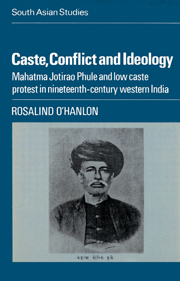 Caste, Conflict and Ideology
Caste, Conflict and Ideology Book contents
- Frontmatter
- Contents
- Acknowledgements
- Notes on translations and area under study, with map
- Part 1 Introduction
- Part 2 Religion and society under early British rule
- Part 3 Jotirao Phule and his circle: the emergence of a distinctive radical voice
- Part 4 The creation of a lower caste identity in history and popular culture, 1869–73
- 7 Ritual status and political conflict in later nineteenth-century Maharashtra
- 8 The Aryan invasions and the origins of caste society
- 9 Warriors and cultivators: the reinterpretation of popular culture
- 10 Maratha history as polemic: low caste ideology and political debate in late nineteenth-century Maharashtra
- Part 5 The lower caste community in contemporary society
- Part 6 Ideology and the non-Brahman movement in the 1880s
- Bibliographic note
- Bibliography
- Glossary
- Index
8 - The Aryan invasions and the origins of caste society
from Part 4 - The creation of a lower caste identity in history and popular culture, 1869–73
Published online by Cambridge University Press: 14 October 2009
- Frontmatter
- Contents
- Acknowledgements
- Notes on translations and area under study, with map
- Part 1 Introduction
- Part 2 Religion and society under early British rule
- Part 3 Jotirao Phule and his circle: the emergence of a distinctive radical voice
- Part 4 The creation of a lower caste identity in history and popular culture, 1869–73
- 7 Ritual status and political conflict in later nineteenth-century Maharashtra
- 8 The Aryan invasions and the origins of caste society
- 9 Warriors and cultivators: the reinterpretation of popular culture
- 10 Maratha history as polemic: low caste ideology and political debate in late nineteenth-century Maharashtra
- Part 5 The lower caste community in contemporary society
- Part 6 Ideology and the non-Brahman movement in the 1880s
- Bibliographic note
- Bibliography
- Glossary
- Index
Summary
Brahman myths and the discovery of low caste identity
Phule depicted Brahmans as the descendants of Aryan invaders, who had conquered the indigenous people of India. The Brahmans had usurped the inhabitants’ rightful power and property, and had imposed their religion as an instrument of social control designed to perpetuate their rule. This formed the central polemical device in Phule's explanation of the sufferings of the lower castes. It was through this argument that he was able to deny the legitimacy of Brahmanic religious authority, to assert the hidden Kshatriya identity of all lower castes, and to reinterpret the most important stories, figures, and symbols in popular Hinduism from a new and radical perspective. In this interpretation of ancient Indian history, it is clear that he had drawn very heavily on the missionary accounts that were described in chapter 3, and in particular on the arguments of John Wilson's work India Three Thousand Years Ago.
Phule described how ‘the Aryan progenitors of the present Brahman race’ came originally from a region beyond the Indus, attracted by the proverbial wealth of India and the fertility of its land. They met with fierce resistance from the original inhabitants whom they subjugated, and traces of this ancient struggle were still to be seen in the terminology used to describe the lower castes in the present day. The term Shudra was popularly used to mean ‘low’ or ‘insignificant’ and to denote the lowest of the four varnas, while the term ‘Mahar’ probably derived from the phrase maha-ari, meaning ‘the great enemy’.
- Type
- Chapter
- Information
- Caste, Conflict and IdeologyMahatma Jotirao Phule and Low Caste Protest in Nineteenth-Century Western India, pp. 141 - 151Publisher: Cambridge University PressPrint publication year: 1985


